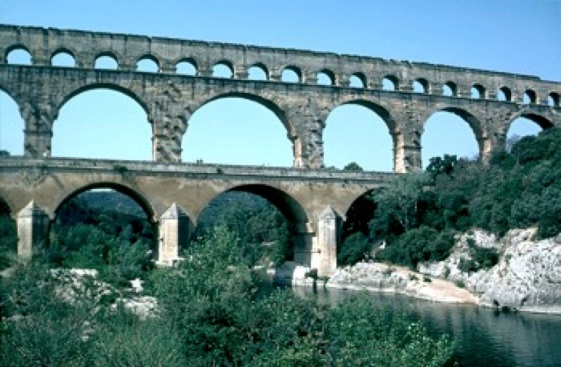A Multi-media Sermon
Both the scripture and message from a worship service I led July 31, 2016, are more timely than I realized at the time. President-elect Donald Trump is not the first man to declare himself “great,” or to blur the lines between allegiance to God and allegiance to self.
Call to Worship (and first scripture):
Colossians 3:1-17 New International Version (NIV)
One: Since, then, you have been raised with Christ, set your hearts on things above, not on earthly things.
Many: For you died, and your life is now hidden with Christ in God. When Christ, who is your life, appears, then you also will appear with him in glory.
One: Put to death, therefore, whatever belongs to your earthly nature: immorality, lust, evil desires and greed, which is idolatry. You used to walk in these ways, in the life you once lived.
Many: But now you must also rid yourselves of all such things as these: anger, rage, malice, slander, and filthy language from your lips.
One: You have taken off your old self with its practices and have put on the new self, which is being renewed in knowledge in the image of its Creator.
Many: Here there is no Gentile or Jew, circumcised or uncircumcised, barbarian, Scythian, slave or free, but Christ is all, and is in all.
One: Therefore, as God’s chosen people, holy and dearly loved, clothe yourselves with compassion, kindness, humility, gentleness and patience.
Many: Bear with each other and forgive one another if any of you has a grievance against someone. Forgive as the Lord forgave you.
All: And over all these virtues put on love, which binds them all together in perfect unity.
Old Testament Reading
Ecclesiastes 1:1-2, 2:18-23
1 The words of the Teacher,[a](A) son of David, king in Jerusalem: 2 “Meaningless! Meaningless!”says the Teacher. “Utterly meaningless! Everything is meaningless.”
18 I hated all the things I had toiled for under the sun, because I must leave them to the one who comes after me. 19 And who knows whether that person will be wise or foolish? Yet they will have control over all the fruit of my toil into which I have poured my effort and skill under the sun. This too is meaningless. 20 So my heart began to despair over all my toilsome labor under the sun. 21 For a person may labor with wisdom, knowledge and skill, and then they must leave all they own to another who has not toiled for it. This too is meaningless and a great misfortune. 22 What do people get for all the toil and anxious striving with which they labor under the sun? 23 All their days their work is grief and pain; even at night their minds do not rest. This too is meaningless.
_________________________________________________________________
New Testament Reading
Luke 12:13-21 (NIV)
13 Someone in the crowd said to him, “Teacher, tell my brother to divide the inheritance with me.” 14 Jesus replied, “Man, who appointed me a judge or an arbiter between you?” 15 Then he said to them, “Watch out! Be on your guard against all kinds of greed; life does not consist in an abundance of possessions.” 16 And he told them this parable: “The ground of a certain rich man yielded an abundant harvest. 17 He thought to himself, ‘What shall I do? I have no place to store my crops.’ 18 “Then he said, ‘This is what I’ll do. I will tear down my barns and build bigger ones, and there I will store my surplus grain. 19 And I’ll say to myself, “You have plenty of grain laid up for many years. Take life easy; eat, drink and be merry.”’ 20 “But God said to him, ‘You fool! This very night your life will be demanded from you. Then who will get what you have prepared for yourself?’ 21 “This is how it will be with whoever stores up things for themselves but is not rich toward God.”
————————————————————————–
Jerusalem June 2016
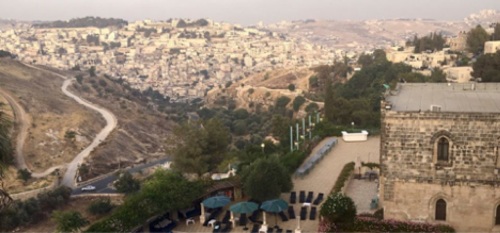
photo credit: Barry Gilbert
Isn’t it amazing how the lectionary sometimes dovetails so closely to current events? When I read the lectionary scripture, after coming back from our tour of Israel, I was reminded of another quote from Ecclesiastes: “There’s nothing new under the sun.”
While I am tempted to point immediately at current figures in the news who bandy about the term “great,” I’m going to go back to much earlier times, to the person who history has often referred to as Herod the “Great.”
Herod the Builder
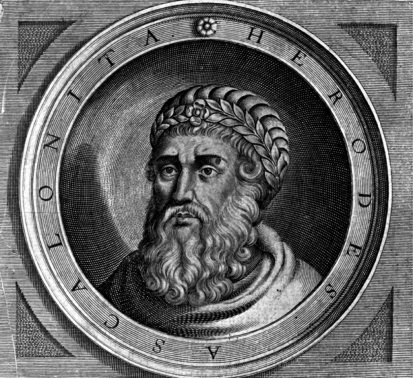
One reason for giving that Herod a modifier was that there were two Herods in the gospels: the Herod who the gospel of Matthew said killed all the babies of Bethlehem, and his son, Herod Antipas, who had John the Baptist executed and who handed Jesus back to Pontius Pilate for his eventual crucifixion. One might call the first of these despots Herod the Elder.
I certainly wouldn’t call him “great.” We don’t have other corroborating evidence for Matthew’s accusation of the slaughter of innocents in Bethlehem, but we do have multiple instances of that Herod ordering the deaths of many people in the area he controlled, including the murder of two of his own sons, and several mass crucifixions of Jews he considered to be political opponents.
This Herod I would call Herod the Builder.
Caesarea
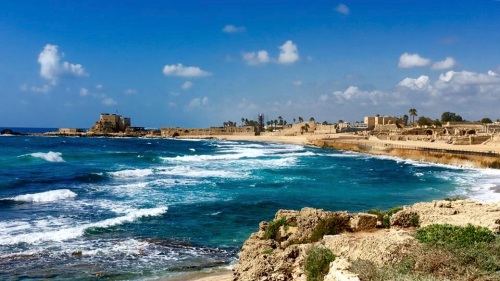 Barry Gilbert
Barry Gilbert
He built the city of Caesarea, whose ruins we toured. It is full of beautiful stone edifices and many examples of the excesses that the Romans encouraged their designated elite to build for themselves all over the empire. Theaters and chariot race tracks — really.
Herod’s Fresh-water Swimming Pool
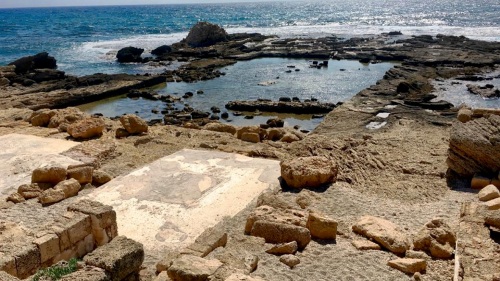 Barry Gilbert
Barry Gilbert
Here’s one example of the excesses of wealth and power: a swimming pool on the edge of the beach of the Mediterranean. It was a fresh water pool, filled with fresh water brought from 20 kilometers away. This is a sort of outdoor example of Roman-inspired excess, ruins of which you can see all over the former Roman empire, from Britain to Palestine, that is, bath houses.
These bath houses, which were open only to the elite, were the primary reason that the Romans built aqueducts.
Roman Aqueduct in Southern Gaul
Yes. The Romans built aqueducts to supply water for their bathhouses. I learned that fact from Jon Dominic Crossan’s book on the life of the early church. Roman aqueducts were, for Crossan, the perfect and revealing symbol of Roman imperial rule. They syphoned precious water from the countryside — not for irrigation of crops as I had always assumed, not even for drinking water for people in the cities. No, the aqueducts took the countryside’s water for the bath houses, so that the fat-cat middle managers like Herod and his lieutenants could loll about in water that could have given life to crops and animals and people.
That’s not “great.” That’s what the writer of Ecclesiastes called “meaningless.” Many of Herod the Builder’s projects carried out that same principle of taking the necessities of the people and using them for the luxury and ego of the rich and powerful. Caesarea was paid for by taxing the people into destitution, as Crossan documented over and over in his 600-page book. It’s one of the reasons that “tax collectors” are so often lumped with “sinners” in the gospels. Because tax collectors were often state-conscripted and -sponsored robbers of the people.
I would say, “Oh don’t get me started,” but I’ve already gone down that route, haven’t I? Taxes then were not like the taxes that we vote for now. We vote to tax ourselves to pay for schools and roads and the Environmental Protection Agency and the Securities and Exchange Commission and the army, navy and air force and Social Security and Medicare and Medicaid and food stamps … That’s what we want our taxes to pay for, not to siphon life-giving water into bath houses for the rich.
But back to Herod.
Herod the Builder’s most meaningless project was the fortress on the top of Masada, a mountain south of Jerusalem.
View from the top of Masada
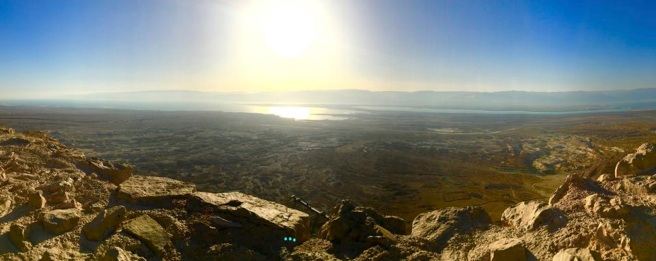 Barry Gilbert
Barry Gilbert
Here’s a view from the fortress. It was designed to give Herod a place to run to if he lost control of Jerusalem. Anyone attacking him there would have to scale a mountain first. He built the fortress with a double wall, to slow down any army that made it to the top of the mountain.
He built a bath house there, and spacious apartments for himself and his royal retinue. He also built barracks for soldiers and many, many storehouses for grain.
Grain Storage Rooms at Masada
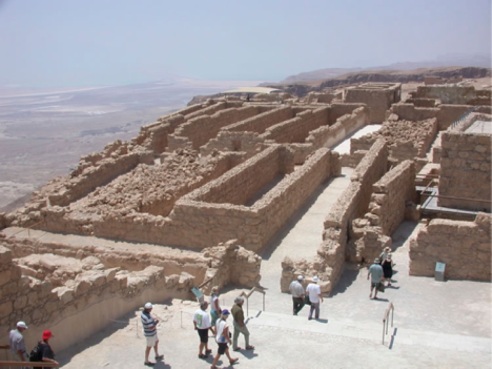 Internet stock photo
Internet stock photo
So here we come back to the scripture today. When I read in Jesus’ parable about the rich man’s plans to build larger barns, I couldn’t help but think of the grain storehouses that Herod built on Masada. Long, stone-walled rooms that were designed to allow Masada’s defenders to survive months of siege.
Maybe you know — Herod the Builder never lived at Masada. He died a horrible death of kidney disease. His son, Herod Antipas, never lived at Masada either. He died in exile. Luke could have been writing about Herod the Builder when he quoted Jesus saying, “who will get what you have prepared for yourself?”
The only people to use Masada as a fortress were rebels during the insurrection that resulted in the Roman destruction of Jerusalem — including Herod’s palace and the second temple.
Roman Ramp at Masada
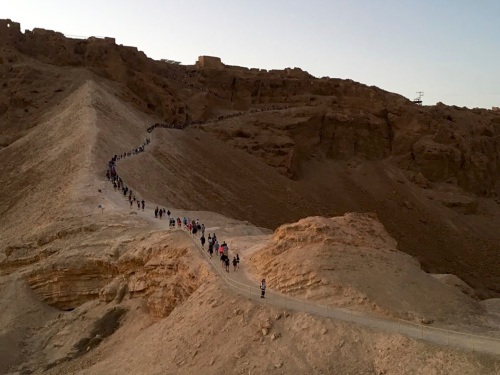 Barry Gilbert
Barry Gilbert
The rebels and their families survived for months in the fortress and watched helplessly as the Romans built a ramp up the side of the mountain. (This is the ramp that Barry and I climbed to get to the top of Masada to watch the sun rise.)
As the Roman soldiers broke into the outer wall of the fortress, the rebels killed their families and committed suicide rather than surrender. When the Romans breached the inner wall, they found hundreds of bodies.
Meaningless, meaningless.
Another View from Masada
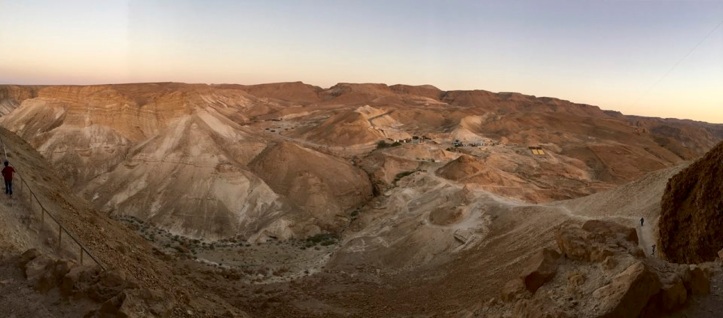 Barry Gilbert
Barry Gilbert
“What do people get for all the toil and anxious striving with which they labor under the sun? All their days their work is grief and pain; even at night their minds do not rest. This too is meaningless,” wrote the writer of Ecclesiastes.
I also think of Herod when I read the verse in Ecclesiastes that laments that “a person may labor with wisdom, knowledge and skill, and then they must leave all they own to another who has not toiled for it.” As I said before, Herod killed two of his sons, because he feared they were conspiring to take what he had built. Imagine, thinking it meaningless to leave all you own to “another who has not toiled for it.”
I think it’s not an accident that the parable in Luke begins with two men disputing their inheritance. Jesus’ response to them is, ““Watch out! Be on your guard against all kinds of greed; life does not consist in an abundance of possessions.”
How many times does humanity need to be told that, before it sinks in? “life does not consist in an abundance of possessions.”
Let’s look at some subtleties of this parable, starting with its beginning: “The ground of a certain rich man yielded an abundant harvest.”
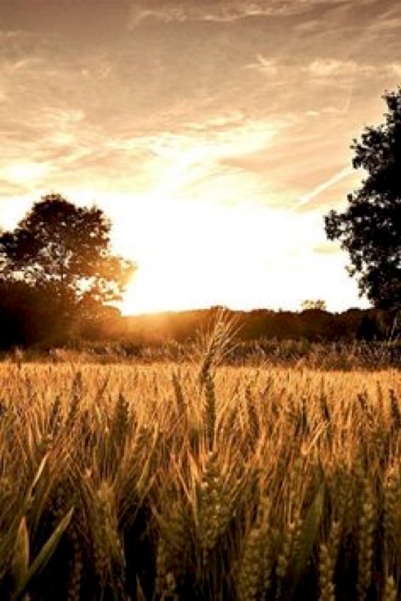
Notice that the rich man did not “toil” for this abundance. The ground yielded it. Grain is a gift from God. There’s no question someone has to toil to harvest the grain. But the person or corporation that is considered to be the owner of the ground doesn’t usually do the toiling.
So this rich man, seeing all the abundance of the harvest and his overflowing barns, doesn’t spend a moment expressing gratitude, either to God or to the field laborers. He thinks only of how to make room to hoard this abundance for himself, so that he’s set for years to come. He’s not even thinking about “who will get what you have prepared for yourself?”
But what does it mean to be “rich toward God”? Jesus’s and Luke’s audience would have known what he meant when he said that.
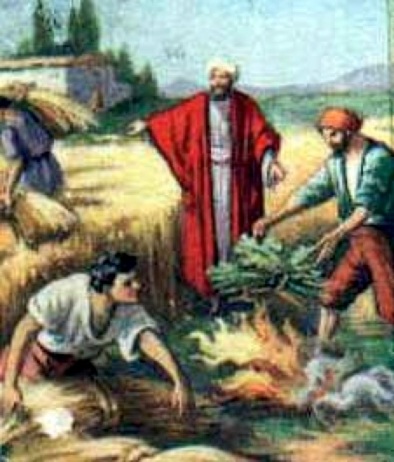
The Hebrew Bible is very clear about how people are to treat abundant harvests: We are to share with those who have none. Hebrew scripture and Jewish liturgy are full of commands: Remember, you once were strangers. Take care of the stranger, the orphan, the widow, those who have less than you. Leave grain on the edges of your fields for the poor, set aside some bread for the hungry. And remember that Adonai rescued you from bondage, and from hunger and share with your neighbor.
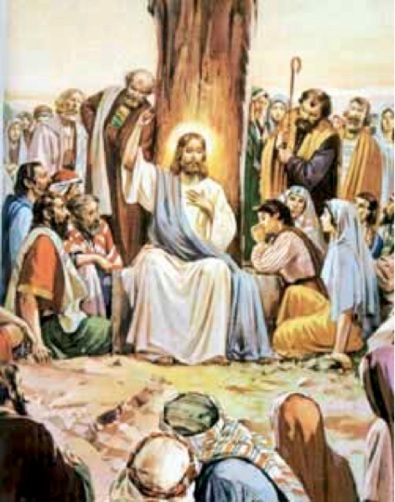
Consider the Lilies
In the verses in Luke following the parable of the rich man we get the very familiar sayings of Jesus about the lilies of the field, which begins, “do not worry about your life, what you will eat; or about your body, what you will wear. 23 For life is more than food, and the body more than clothes.” He goes on to urge his followers to sell their possessions and give to the poor.
In this chapter in Luke, Jesus is not talking to the destitute who faced hunger every day, those for whom “give us this day our daily bread” is not a metaphor, but a very real plea. He is talking to those who have an inheritance to fight over, those who have surplus they don’t know what to do with.
And when Jesus says life is more than food, he’s talking about how we treat each other. The writer of the letter to Colossians expands on this concept. Maybe you noticed, I slipped a third scripture from the lectionary into the call to worship this morning. The letter writer, a student of Paul’s, calls on the Colossians to “put on new clothes.”
Reject one set of views of the world — take them off like a worn-out coat — immorality, lust, evil desires and greed, which is idolatry. Rid yourselves of anger, rage, malice and slander. They knew then and we know now, greed and malice and slander are destructive to the individual as well as to society. Such a view of the world leads to meaningless striving for the wrong things.
Put on a new set of clothes, the letter writer says: compassion, kindness, humility, gentleness and patience. I would add a subset that is part of compassion and kindness, that is, generosity or sharing.
Tzfat
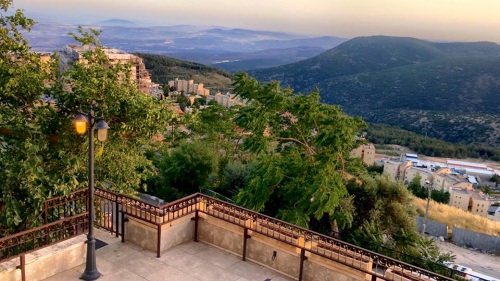 Barry Gilbert
Barry Gilbert
Our tour group of 19 people did a lot of sharing, of food, prayer, music and help — carrying things, finding our way, explaining things.
Our tour in Israel took us to Jerusalem and the Galilee. We rafted on the Jordan River and we floated in the Dead Sea. We ended our tour in Tzfat, also known as Safed or Safad, the home of Kabbala, mystic Judaism. Perhaps you have heard or read of the pop star Madonna discussing Kabbalistic teachings.
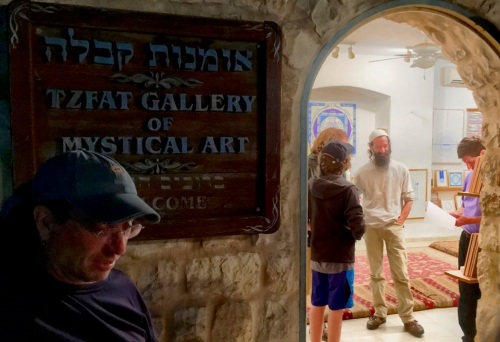 Barry Gilbert
Barry Gilbert
We met a Kabbalist artist, Avraham Lowenthal, who created a painting and then made a necklace of it, portraying what he calls Teshuva Heh. Teshuva is the Hebrew word for “turning around” or “returning to” and is translated into English as “repentance.” Heh is the Hebrew letter that is used twice in the initials for the divine, YHWH, or Yahweh.
Teshuva ה: Return to G_D
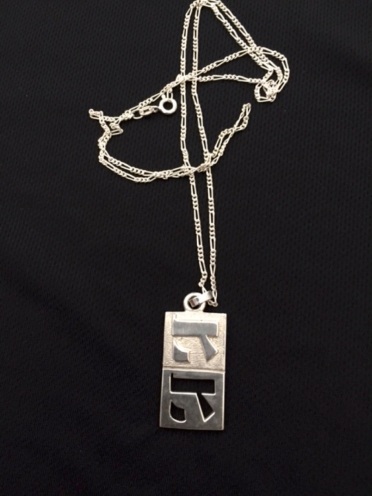 Virginia Gilbert
Virginia Gilbert
In the painting and this necklace, the hollow Heh is a life without God and the raised Heh above it is a life filled with God.
Here is Lowenthal’s explanation:
“The bottom Heh is associated with our desire to receive for the self (the place of conditional love). The upper Heh is associated with the desire to give (the place of unconditional love).”
In my words, the hollow Heh — I think of that as the meaninglessness that the writer of Ecclesiastes writes about. The filled Heh — that is a life of abundance, of recognizing God’s gifts to us and sharing them with others. A life of compassion, kindness, humility, gentleness and patience. And recognizing that the real Great one is God.
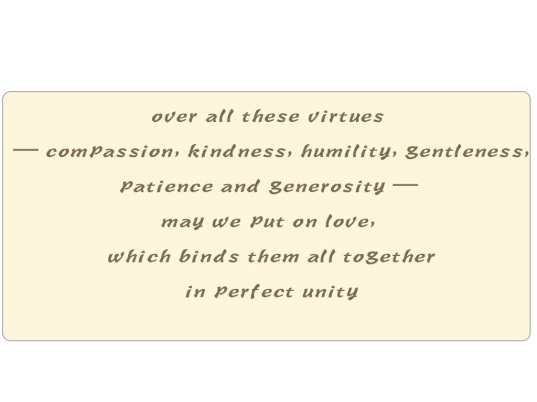
As the writer to Colossians said, and as we prayed today in our opening, prayer, “over all these virtues — compassion, kindness, humility, gentleness, patience and generosity — may we put on love, which binds them all together in perfect unity.”
And that is the definition of Great.
Praise God. Amen.

